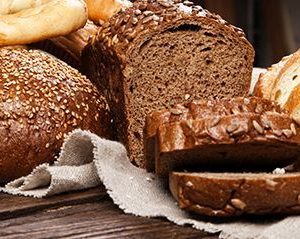- Recognizing the Signs of Hypothyroidism
- 10 Strategies to Overcome Insomnia
- Could Artificial Sweeteners Be Aging the Brain Faster?
- Techniques for Soothing Your Nervous System
- Does the Water in Your House Smell Funny? Here’s Why
- Can a Daily Dose of Apple Cider Vinegar Actually Aid Weight Loss?
- 6 Health Beverages That Can Actually Spike Your Blood Sugar
- Treatment Options for Social Anxiety Disorder
- Understanding the Connection Between Anxiety and Depression
- How Daily Prunes Can Influence Cholesterol and Inflammation
Whole Wheat Better for You Than White Bread, Study Confirms

New research reinforces advice to include more whole grains in your diet.
A diet heavy in “refined” grains (such as white bread, cookies and muffins) may increase your risk for heart disease and early death, while whole grains may lower it, according to the study.
“We encourage people to have moderate consumption of carbohydrates and to have different types of grain, especially whole grain,” said lead researcher Mahshid Dehghan, of the Population Health Research Institute at McMaster University in Hamilton, Ontario, Canada.
“Reduction in quantity and improving the quality of carbohydrates is the message of our study,” Dehghan said.
Grains like oats, rice, barley and wheat make up about half of diets around the world and as much as 70% in low- and middle-income countries, particularly in Africa and South Asia, the researchers noted.
The findings don’t prove that a diet heavy in refined grains causes stroke, heart attacks or other forms of heart disease, only that there seems to be a link.
For the study, the research team collected data on more than 137,000 people in 21 countries who were aged 35 to 70, had no history of heart disease and were tracked for more than nine years.
People who reported eating 12 ounces of refined grains a day were found to have 27% higher odds of early death and a 33% higher risk of heart disease than those who limited their intake to less than 2 ounces a day.
A diet heavy in refined grains was also linked to higher blood pressure, the findings showed.
The participants self-reported the quantity and type of grains in their diet, so the researchers noted that they can’t vouch for accuracy of that data.
The study looked at white rice apart from other refined grains because more than 60% of participants lived in Asia, where rice is a staple.
Dehghan said no significant link was found between eating whole grains or white rice and adverse health outcomes.
“Getting about 50% to 60% of energy from carbohydrates is OK, but we encourage people to lower their carbohydrate consumption,” she said.
The report was published online Feb. 3 in the BMJ.
Samantha Heller, a senior clinical nutritionist at NYU Langone Health in New York City, reviewed the findings.
“We can all benefit by including more whole grains, such as quinoa, barley, kasha, whole wheat, oats and corn, in our daily fare,” Heller said.
Whole grains contain fiber, vitamins, minerals and protective phytochemicals that are important for health.
In contrast, refined grains contain no fiber. They’re found in sugary cereals, white bread, cookies, cakes, muffins, crackers, pastries, desserts, and fast and junk foods, Heller explained.
“When we consume an overabundance of refined grains, meaning the fiber and nutrients have been removed, we deprive our bodies of these health-promoting nutrients, and they are often replaced with sugar, saturated fat, sodium and empty calories,” she said.
Research has found that dietary patterns rich in fiber, plant foods and whole grains help reduce the risk of chronic illness, such as heart disease, certain cancers and diabetes, Heller noted.
“We need to balance our dietary patterns to be more fiber-focused and plant-heavy,” she said.
There are many ways to add whole grains to the diet, and people should check products to be sure they’re getting whole grains, Heller advised.
“Try whole wheat tortillas filled with pinto beans, zucchini and carrots; whole grain cereals such as oatmeal or shredded wheat; brown rice topped with stir-fried peppers, broccoli, snap peas and tofu; vegetarian chili made with bulgur, kidney beans and any vegetables you have on hand; or a hummus, tomato and cucumber sandwich on whole multigrain bread,” Heller suggested.
More information
For more on healthy grains, head to the U.S. Department of Agriculture.
SOURCES: Mahshid Dehghan, PhD, investigator, Population Health Research Institute, McMaster University, Hamilton, Ontario, Canada; Samantha Heller, MS, RD, senior clinical nutritionist, NYU Langone Health, New York City; BMJ, Feb. 3, 2021, online
Source: HealthDay
Copyright © 2026 HealthDay. All rights reserved.










